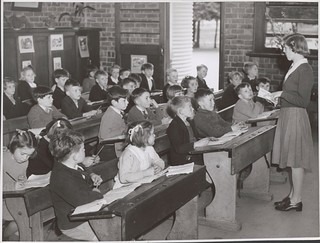The other night, I found myself watching ‘The Secret Life of 4 year olds.’ I’d watched a previous episode a few months ago and I had enjoyed it, but this time I found myself taking notes, and recognising the terminology used by the child psychologists, and could relate some of the methods to what we’ve been learning about in lectures. What made this documentary different to others I have watched of a similar nature, was that there was very little adult influence. The child psychologists observed the children through hidden cameras, thus giving us an honest representation of the way children act at this age.
“At the age of four, the average girl tends to be five months ahead of the average boy, in terms of their language skills.” On initial thought, this doesn’t seem to be that big of a development gap, however this can put boys at a disadvantage when it comes to social interaction. Throughout the programme, it was evident that most of the girls were more capable of voicing their concerns, and expressing what they were enjoying or found upsetting. Some of the boys on the other hand, found this a lot more challenging, and would get frustrated at not being able to convey how the felt inside, in words. This often resulted in the child becoming distressed and uncomfortable.
Another aspect of the programme i found interesting was the contrast between girls and boys. At this age, children will self segregate when it comes to gender. A girl team captain was selected and also a boy team captain. Taking it in turns, they picked members for their teams, which resulted in a girls team and boys team. They then went on to have a ‘relay’ type competition, in which the first child of each team would race against each other with a bean bag placed on their head. The rules being, you weren’t allowed to touch or hold the beanbag. The boys finished first and the girls were quite rightly not satisfied with the result. Every boy had compromised the rules, in order to win. The girls on the other hand had spent longer completing the task, however were strictly abiding by the rules. This game concluded that at the age of four, there seems to be a difference in moral importance and priority, in girls and boys.
The favourite childhood line “I’m telling my mum on you!” made an appearance a few times throughout the documentary. At one point, two girls were arguing, and telling each other who they were going to ‘tell on them’ to. The child psychologists gave us an insight of what this says about the particular children. Both girls were listing people they considered to be of important moral authority in their lives. Their parents, grandparents, older brothers and sisters. As the list went on, they became more elaborate and these authority figures included the Tooth Fairy, and Father Christmas. All people who make judgements about our behaviour, and have the power to punish us. This also was an example of the children being very egocentric, and assuming that others would value the same people as them as authoritarian.
At four years old, there’s a fine line between being assertive, and being aggressive. The children spent a lot of time experimenting and figuring out where that line is. As they began to develop friendships, the natural instinct for that child is to test it; to prod at it, and see if they can break it, before they fully understand what the concept of ‘friendship’ means. It was interesting to watch two children fall out over who was going down the slide with who, with one child rushing off crying, unsure of how to cope with the situation. Within minutes, it was resolved and they were walking off together, hand in hand. There’s something so refreshing about a child’s sense of forgiveness and on reflection, some adults could learn a thing or two from watching these children!
Coming to the end of the programme, the last ‘experiment’ involved each child being given a wrapped gift. Ten out of the twelve presents contained a toy bubble blower, and the others contained just the wrappings, and a peg. Scientists use this method to gain an insight into the children’s ability to regulate their emotions. The presents were given out at random, and each opened. Naturally, the two children that didn’t receive the toy were disappointed, however their reactions differed. The girl who received the peg voiced her disappointment, but had the skills to not become overwhelmed by these feelings. However, the boy who received the peg hadn’t yet grasped the idea of how to react, and was unable to recover from the situation, and took himself to the corner, where he sat by himself crying. At this age, they’re learning, through experiences like this, how to handle and control their emotions. This particular boy was still coming to terms with the correct way to deal with the disappointment. After about ten minutes, two extra bubble blowers were brought out to resolve the situation, and all the children could be seen enjoying their new toys and interacting with one another, and slowly beginning to learn that others have feelings too.
I thoroughly recommend watching this programme (even though I have quite possibly given away all the good parts). It was very insightful into understanding the level of development these children are at, just months before they embark on a new chapter. Primary School.


